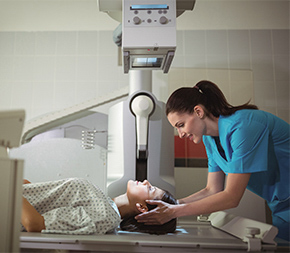In this Article

Radiology technologists, who perform diagnostic and in-procedure imaging, work alongside other providers on a healthcare team. They earn a median salary of $73,410, according to the U.S. Bureau of Labor Statistics.
Overview
Radiology technologists perform medical imaging services for patients who are ill or injured. They take X-rays to start but can earn certifications that will allow them to use other imaging technologies as well.
The top 10% of radiology technologists—also called radiographers, X-ray technicians, and radiologic technologists—earn $102,380 and the bottom 10% earn $50,020.
Salaries vary by state. While these figures can be helpful, keep in mind that the cost of living also varies by location.
How much an individual radiology technologist can earn depends on many factors, including:
- Geography:
- Salaries are higher in some regions than in others.
- Education:
- Technologists with more advanced degrees tend to make more than those with the minimum education to become a radiology technologist.
- Experience:
- The expertise you develop over time can lead to higher earnings.
- Certification:
- Multiple certifications can allow you to create more than one kind of image, which may increase your pay.
- Workplace:
- The setting where you work can influence earnings.
- Specialty:
- Developing sought-after expertise in a medical specialty can push up salaries.
Whether you work in a rural, suburban, or urban area can also influence a radiology technologist salary.
Cities are home to many hospitals and health systems. This means that there are more positions for radiology technologists in urban areas. Urban workplaces tend to offer higher salaries for radiology technologists, and healthcare professions in general, to attract top candidates and compensate for higher costs of living.
In the U.S., all of the highest-paying cities are in California, according to the BLS.
More Factors that Affect Salary
Geography is just one of many factors that can influence the salary of a radiology technologist. To proactively advance your career, you can set yourself up for professional opportunities.
“One neat thing about radiography is that once you start off, you’re just getting started on professional opportunities you can explore over the course of your career,” says Peter Rath, MPA, RT (R), ARRT, who evaluates continuing education programs at the American Society of Radiologic Technologists
Here, we’ll look at how education, experience, certifications, and workplace setting can influence the salary of a radiology technologist.
Education
All radiology technologists must complete at least an associate degree in radiology. Your education doesn’t have to stop there, though. “Continuing your education can create many opportunities for radiologic technologists,” Rath says.
A bachelor’s degree in radiological science or healthcare administration are natural next educational steps for radiographers.
Additional relevant education generally translates to a higher salary and can influence your career trajectory. A bachelor’s degree is generally required if a radiology technologist wants to advance to a supervisory or managerial role, Rath says. Along with more responsibility, these promotions can increase earnings.
The timing is actually terrific for ambitious radiology technologists entering the field, Rath says.
“Many people are retiring from supervisory and management positions, which creates room for younger or newer technologists to advance in a faster time frame,” he says.
Experience
Entry-level positions for radiology technologists generally pay less than roles filled by more experienced techs. While you can’t fast-forward the calendar to gain years on the job, you can gain additional experience in other ways.
“In smaller and rural hospitals, you’ll have more opportunities to do different things and work in different capacities,” Rath says. “They’re more likely to allow radiographers to cross-train in other modalities, such as mammography and CT imaging, which leads to extra skills. It’s easier to become a Jack or Jane of all trades in rural and small settings.”
Gaining experience across departments and imaging modalities can set you up for earning a higher income.
Certification
To begin their career, radiology technologists can earn the Registered Radiologic Technologist R.T. (R) certification from the American Registry of Radiologic Technologists (ARRT). You don’t have to stop there, though.
“Someone entering the field who wants a challenge can earn certifications in modalities beyond radiography,” Rath says. You can begin this process while earning your associate degree or after you’ve begun working.
Workplace
A radiology technologist salary may vary by workplace too. Here’s a look at median annual salaries in four primary workplaces, according to BLS data.
| Workplace | Annual Median Wage |
|---|---|
| Outpatient Care Centers | $89,490 |
| Hospitals | $76,160 |
| Medical and Diagnostic Laboratories | $74,260 |
| Physicians’ Offices | $65,840 |
Job Outlook
“Most people considering becoming a radiologic technologist ask, ‘Is this a profession I can rely on as a career?'” Rath says. “The answer is: most definitely.”
The BLS’s job growth forecast for radiology technologists is 5.5% through 2032, slightly higher than the average growth of all U.S. jobs.
“As we see the baby boom generation age, they access healthcare in greater numbers,” Rath explains. “That’s pushing demand for more facilities and more radiographers.”
Where the Jobs Are
“Employment rates for radiologic technologists continue to be high and stable,” Rath says. “There is an especially high demand for radiographers in growing communities.”
That makes sense, since more people living in an area will mean more people who need radiography for broken bones, blocked blood vessels, lung infections, and other conditions. It should come as no surprise, then, that more populous areas have greater demand for radiographers.
“As working technologists reach the end of their careers, demand for radiographers increases,” Rath says. “There’s more and more need for radiologic technologists to enter the field.”
Radiology Technologist Salaries Versus Related Healthcare Roles
If you have a drive to help people, becoming a radiology technologist is not the only option. Other healthcare roles provide opportunities to serve patients.
Here’s a comparison with similar professions that require an associate degree, along with median salaries for each.

Written and reported by:
Catherine Ryan Gregory
Contributing Writer

With professional insight from:
Peter Rath, MPA, RT (R), ARRT
Continuing Education Program Evaluator
American Society of Radiologic Technologists